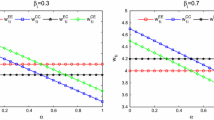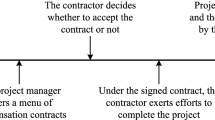Abstract
A suitable and attractive contract may bring large profits and lower the risk caused by uncertain information in project management; thus, how to design incentive contracts under uncertainty has been the most pressing demand for the owner. This paper investigates the project incentive contract design problem with random asymmetric information, in which a risk-neutral owner (he) engages a risk-averse contractor (she) to complete a project. The contractor’s construction capacity is private information and characterized as a random variable. Furthermore, two incentive contracts, duration-based contract and deadline-based contract, are designed, where the owner offers a fixed payment and a penalty or bonus factor based on the real project duration and a predetermined deadline for the contractor in these two different contracts. Then, a project duration contract and a deadline-based contract model are developed with the purpose of maximizing the owner’s expected payoff, respectively. The optimal contracts are investigated, and the values of the contractor’s construction capacity information for the owner under these two contracts are quantified. The results show that the owner benefits better from getting more construction capacity information and should commit an information rent to the contractor due to asymmetric information, which distorts the penalty factor under both contracts. Moreover, regardless of contract type, the deadline has no effects on the owner’s incentive term and only affects the fixed payments. Further, the contractor is more likely to keep information private, while the owner benefits more from knowing the contractor’s construction capacity when the deadline-based contract is used.





Similar content being viewed by others
Notes
We have examined the case where the contractor’s minimum net incoming is R > 0, and find that the results will not be changed.
References
Afshar A, Fathi H (2009) Fuzzy multi-objective optimization of finance-based scheduling for construction projects with uncertainties in cost. Eng Optim 41:1063–1080
Ammar MA (2011) Optimization of project time-cost trade-off problem with discounted cash flows. J Constr Eng Manag 137:65–71
Ashfaq RAR, Wang XZ, Huang JZX, Abbas H, He YL (2017) Fuzziness based semi-supervised learning approach for intrusion detection system. Inf Sci 378:484–497
Ayaǧ Z (2014) An integrated approach to concept evaluation in a new product development. J Intell Manuf. doi:10.1007/s10845-014-0930-7
Azariadis C (1983) Employment with asymmetric information. Q J Econ 98:157–172
Baron DP, Myerson RB (1982) Regulating a monopolist with unknown costs. Econometrica 50:911–930
Bayiz M, Corbett CJ (2005) Coordination and incentive contracts in project management under asymmetric information. Working paper, UCLA Anderson School
Cachon GP (2003) Supply chain coordination with contracts. In: Hand-book in operations research and management science: supply chain management. Kluwer, Amsterdam, The Netherlands
Chen YJ (2013) Risk-incentives trade-off and outside options. OR Spectr 35:937–956
Dutta S (2008) Managerial expertise, private information, and pay-performance sensitivity. Manag Sci 54:429–442
Grossman SJ, Hart OD (1983) Implicit contracts under asymmetric information. Q J Econ 98:123–156
Homberger J (2007) A multi-agent system for the decentralized resource-constrained multi-project scheduling problem. Int Trans Oper Res 14:565–589
Kwon H, Lippman S, Tang C (2010) Optimal duration-based and cost-based coordinated project contracts with unobservable work rates. Int J Prod Econ 126:247–254
Kwon H, Lippman S, Tang C (2011) Sourcing decisions of project tasks with exponential completion times: impact on operating profits. Int J Prod Econ 134:138–150
Laffont J, Tirole J (1986) Using cost observation to regulate firms. J Polit Econ 94:614–641
Mirrlees JA (1971) An exploration in the theory of optimum income taxation. Rev Econ Stud 38:175–208
Mirrlees JA (1974) Notes on welfare economics, information and uncertainty. In: Balch M, McFadden D, Wu S (eds) Essays in equilibrium behavior under uncertainty. North-Holland, Amsterdam
Pathak B, Srivastava S (2014) Integrated fuzzy-HMH for project uncertainties in time-cost tradeoff problem. Appl Soft Comput 21:320–329
Paul A, Gutierrez G (2005) Simple probability models for project contracting. Eur J Oper Res 165:329–338
Stiglitz JE, Weiss A (1981) Credit rationing in markets with imperfect information. Am Econ Rev 71:393–410
Wang XZ (2004) Economic analysis: incentive and constraint mechanism for construction project principal-agents. Bus Manag 6:77–82
Wang XZ (2015) Learning from big data with uncertainty–editorial. J Intell Fuzzy Syst 28:2329–2330
Wang XZ, Ashfaq R, Fu A (2015) Fuzziness based sample categorization for classifier performance improvement. J Intell Fuzzy Syst 29:1185–1196
Wu X, Lan Y, Liu H (2014) Optimal revenue-sharing contract based on forecasting effort for uncertain agency problem. Int J Mach Learn Cybern 5:971–979
Xiao W, Xu Y (2012) The impact of royalty contract revision in a multistage strategic R&D alliance. Manag Sci 58:2251–2271
Yang I (2011) Stochastic time-cost tradeoff analysis: a distribution-free approach with focus on correlation and stochastic dominance. Autom Constr 20:916–926
Yang K, Zhao R, Lan Y (2014) The impact of risk attitude in new product development under dual information asymmetry. Comput Ind Eng 76:122–137
Yang K, Zhao R, Lan Y (2016a) Impacts of uncertain project duration and asymmetric risk sensitivity information in project management. Int Trans Oper Res 23:749–774
Yang K, Zhao R, Lan Y (2016b) Incentive contract design in project management with serial tasks and uncertain completion times. Eng Optim 48:629–651
Author information
Authors and Affiliations
Corresponding author
Ethics declarations
Conflict of interest
All authors have no conflict of interest.
Human participants
This article does not contain any studies with human participants or animals performed by any of the authors.
Additional information
Communicated by Y. Ni.
Rights and permissions
About this article
Cite this article
Qi, L. Project duration contract design problem under uncertain information. Soft Comput 22, 5593–5602 (2018). https://doi.org/10.1007/s00500-017-2527-5
Published:
Issue Date:
DOI: https://doi.org/10.1007/s00500-017-2527-5




